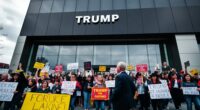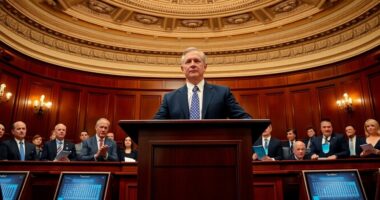You might wonder if a Federal Crypto Reserve could offer lasting value beyond immediate financial gains. By positioning cryptocurrencies as stable assets, it could reshape how we view these digital currencies. However, the potential trade-offs and long-term strategies involved warrant careful consideration. What implications could this have for economic stability and growth? Exploring these questions reveals a complex landscape worth examining further.

Is a federal crypto reserve truly worthwhile? You might find this question complex, but let's break it down. A federal crypto reserve could position cryptocurrencies as long-term financial assets, similar to gold. This shift could help you view digital currencies not just as speculative investments, but as stable, valuable commodities that can hold their worth over time. Moreover, proponents argue that such reserves could potentially reduce national debt by freeing up U.S. dollars for other uses. Imagine having a financial tool that not only stabilizes the crypto market but also contributes to national economic health. If you consider the integration of crypto into mainstream finance, a federal reserve could enhance its use for commercial purposes, making transactions smoother and more reliable. Additionally, diversifying crypto assets within a federal reserve could further mitigate risks associated with market volatility.
However, you should also be aware of the economic risks involved. Committing to a crypto reserve could expose taxpayers to significant financial risks, especially given the highly speculative nature of cryptocurrency investments. While it might stabilize markets and hedge against economic instability, that doesn't eliminate the uncertainty surrounding future returns. You'll want to weigh these risks against the potential benefits carefully.
The debate over regulation is another important aspect to consider. There's currently no clear consensus on whether the SEC or CFTC should oversee cryptocurrencies. Without a well-defined regulatory framework, it's challenging to distinguish between cryptocurrencies as securities or commodities. As a consumer, you'd want to see strong protections in place to ensure market stability and safeguard your investments. Calls for clearer distinctions between securities and commodities are essential for compliance and regulatory clarity.
When it comes to implementation, the Federal Reserve could play a crucial role in managing a crypto reserve, akin to its management of traditional assets. The Treasury might also get involved, especially in securing and managing the reserve. Some proposals suggest a decentralized vault system for secure storage, which could add an extra layer of protection.
Ultimately, if you're looking at the long-term implications of a federal crypto reserve, consider the proposed strategies, such as a 20-year holding period. It's all about strategic asset management that aligns with broader fiscal and monetary objectives. While there are short-term benefits to think about, the real value of a federal crypto reserve could lie in its potential to reshape how you view and interact with cryptocurrencies in the long run.









